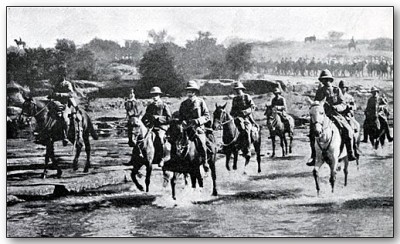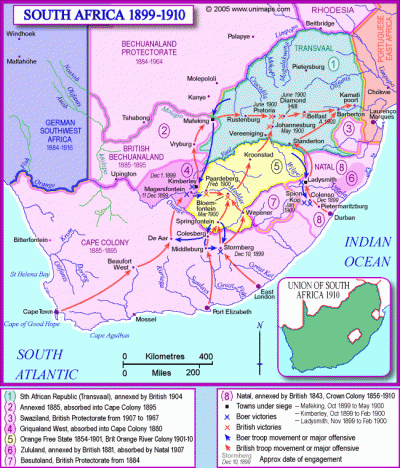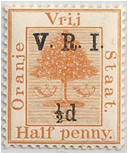ALBUM – view my Orange Free State, British Occupation album
TRANSITION CHART for the South Africa Area
Fast Facts
Region: Southern Africa
Group: Boer Republics
Classification: Military Occupation (British)
Prior Regime: Orange Free State
Key Dates:
1854, Feb 23 – Orange Free State recognized as independent Republic
1869 – Diamonds discovered in Orange Free State
1899, Oct 11 – Second Boer War breaks out
1900, May 28 – British declared ther annexation of Orange Free State, even if the had not yet defeated the Boers
1902, May 31 – Orange Free State becomes Orange River Colony with the signing of the Treaty of Vereeniging
Following Regime: Orange River Colony (British)
Scott Catalogue: (Orange River Colony) #44-54
Pick Catalogue: none
History

The Dutch were the first Europeans to settle the Cape area of Africa in the mid 1600s, where the Dutch East India Company, (Vereenigde Oostindische Compagnie, or VOC) built a resupply station for its ships between India and Europe. In 1814, the British took full control of the Cape Colony area and British settlers began to arrive. The Boers (Dutch settlers) in the region resented British rule and eventually migrated north in the “Great Trek.” In 1838 the Boers fought and defeated the Zulus at the battle of Blood River and eventually founded several republics, most notably Orange Free State and the South Africa Republic (ZAR), which later became Transvaal.
Orange Free State, was officially recognized in 1854, and built a successful republic, which was recognized by many Western European nations including Great Britain as well as the United States. The fortunes of the Republic significantly changed in 1867, when diamonds were discovered. This stimulated a rush of thousands of fortune hunters as well as keen interest from the British. By the early 1870’s, diamonds were a mainstay of the Orange Free State’s income.
Increasingly the British were determined to bring all of South Africa, including the Boer republics under their control. The United Kingdom begin expanding their control in the region, plotting with British settlers within the ZAR to incite a rebellion, in 1895, which was supported militarily. The Boer Republics allied together and captured the troops supported by the British and ended the rebellion. Finally in October 1899 the second Boer war broke out between the Boers and the British.
 At first the Boers were successful but in 1900 as additional British troops arrived, British forces entered the territory of the Orange Free State and occupied the capital Bloemfontein on 13 March 1900. The British government declared an official annexation of the entire Orange Free State, on 6 Oct. 1900, dispite the fact that that British forces had not yet occupied the full territory of the republic, nor defeated the Free State forces. After the occupation of Bloemfontein, a military administration was established under Sir George T. Pretyman, the military governor. His jurisdiction was, however, practically confined to the towns occupied by the British troops. In Feb. 1901 the military governor was replaced by a deputy administrator authority remained largely in the hands of the military.
At first the Boers were successful but in 1900 as additional British troops arrived, British forces entered the territory of the Orange Free State and occupied the capital Bloemfontein on 13 March 1900. The British government declared an official annexation of the entire Orange Free State, on 6 Oct. 1900, dispite the fact that that British forces had not yet occupied the full territory of the republic, nor defeated the Free State forces. After the occupation of Bloemfontein, a military administration was established under Sir George T. Pretyman, the military governor. His jurisdiction was, however, practically confined to the towns occupied by the British troops. In Feb. 1901 the military governor was replaced by a deputy administrator authority remained largely in the hands of the military.
The Orange Free State government had moved their capital to Kroonstad during the first months of the war and would subsequently base operations from there. Over the continuing year, the Free State forces were continually pushed back, and the Boers turned to guerrilla warfare. In a sad note in British History, the British commander, Herbert Kitchener, began herding Boer women and children into concentration camps where more than 20,000 of them died of disease. The Boers surrendered in 1902, and Orange Free State was offically annexed by Great Britain with the ratification of the Treaty of Vereeniging on 31 May 1902, and the Republic ceased to exist as it became the British Protectorate of the Orange River Colony. In 1910, Orange River Colony joined other British Colonies in Southern Africa to form the Union of South Africa.
Stamps
 ALBUM
ALBUM
Early in 1900, as the British began occupying the Free State’s lands, Orange Free State stamps were declared invalid, and the stamps were surcharged and overprinted “V.R.I” (Victoria Regina Imperatrix). The “V.R.I.” overprints had to be applied to postage, revenue and telegraph stamps, leading to a complex series of settings and numerous varieties.
Confident in victory, the British declared ther annexation of Orange Free State on 28 May 1900 (although they handn’t taken the lands yet). With this, in mid 1900, British authorities worked to supercede the V.R.I issues with a definitive issue bearing the portrait of Queen Victoria. However, plans had to be scrapped, following the death of the Queen in January 1901. As a result, additional Free State stamps were overprinted, as well as an additional overprint of Cape of Good Hope stamps with the words “ORANGE RIVER COLONY.”
After the completion of the war, the first occupation overprints were replaced with Edwardian postage stamps, early in 1903.
Banknotes
British currency was used in occupied territory.
Links
The Boer Wars from BBC History
Anglo-Boer War Museum
Orange Free State Study Circle





Good, Evening,
I am looking for the stamp position of 3d value (mauve/ violet with Edward the VII) Orange River Colony from 1903 in mnh** excellent condition. Could you help me. Do you have it?
I’m sorry, I do not have that issue in my collection. Besides, none of my Orange River Colony stamps are in mnh condition.
Good Luck in your search
Michael